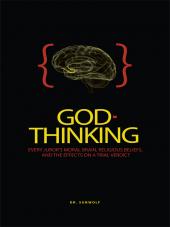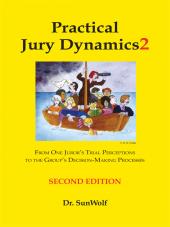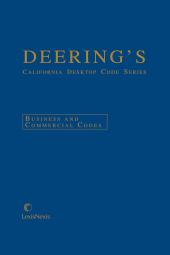God-Thinking: Every Juror's Moral Brain, Religious Beliefs, and The Effects on a Trial Verdict
Select a format
 International Order Inquiry
International Order Inquiry
Select subscription type
Terms & conditions
Subscribers receive the product(s) listed on the Order Form and any Updates made available during the annual subscription period. Shipping and handling fees are not included in the annual price.
Subscribers are advised of the number of Updates that were made to the particular publication the prior year. The number of Updates may vary due to developments in the law and other publishing issues, but subscribers may use this as a rough estimate of future shipments. Subscribers may call Customer Support at 800-833-9844 for additional information.
Subscribers may cancel this subscription by: calling Customer Support at 800-833-9844; emailing customer.support@lexisnexis.com; or returning the invoice marked "CANCEL".
If subscribers cancel within 30 days after the product is ordered or received and return the product at their expense, then they will receive a full credit of the price for the annual subscription.
If subscribers cancel between 31 and 60 days after the invoice date and return the product at their expense, then they will receive a 5/6th credit of the price for the annual subscription. No credit will be given for cancellations more than 60 days after the invoice date. To receive any credit, subscriber must return all product(s) shipped during the year at their expense within the applicable cancellation period listed above.
The total price includes the product(s) listed in the Order Form and any Updates for a limited period (minimum period of 30 days) after the order is placed ("Order Window"). Shipping and handling fees are not included in the grand total price.
All shipments may be returned, at subscribers' expense, for full credit of the Price within 30 days of receipt.
Shipments may not be returned, and no credits will be issued, more than 30 days after receipt.
After the Order Window, subscribers will receive notice of Updates along with the then-current grand total price and order process as Updates become available. Subscribers will only be shipped those Updates they specifically request.
Product description
View a sample of this title using the ReadNow feature
A wide variety of moral compasses is sitting in every jury box! Jurors bring their religions and spiritual beliefs with them to court and rely upon personal moral compasses during deliberations. Every trial, civil or criminal, can become a battle of good and evil in the minds of the jurors, yet trial advocacy books have ignored this dynamic. This book invites trial practitioners, attorneys, judges, and consultants to engage in new thinking about how jurors' moral compasses affect trial outcomes.
Dr. SunWolf was a long-time trial and appellate attorney, now an award-winning social scientist and university professor, who takes the reader into the latest research about the psychology of good and evil and our believing brain--then points to specific ways every juror's religious thinking impacts a verdict, including:
• The Neuroscience of Fair Play
• The Social Psychology of Good and Evil
• The God Gene and the Biology of Belief
• The Science of Moral Dilemmas
• Questionnaire Items that Uncover a Juror's Moral Compass
• Voir Dire Questions and Conversations about the Jury Pool's Religious Thinking
• Trial Tools and Motions that Take a Juror's God-Thinking Into Account
• Pre-Trial Investigations that Reveal a Community's Religious Landscape
As trial practitioners, our job must deal with the variety of moral belief systems jurors are bringing to our courtrooms, in a manner that moves us towards fairer trials and more just verdicts.
eBooks, CDs, downloadable content, and software purchases are noncancelable, nonrefundable and nonreturnable. Click here for more information about LexisNexis eBooks. The eBook versions of this title may feature links to Lexis+® for further legal research options. A valid subscription to Lexis+® is required to access this content.
Table of contents
FORETHOUGHTS
PART I: GOOD AND EVIL IN EVERY JUROR'S MIND
Chapter 1. The Social Psychology of Good and Evil
§ 1-1. Free Will and Determinism in the Garden of Good and Evil
§ 1-2. The Psychology of Good: Altruism and Helping Behaviors
§ 1-3. The Psychology of Evil: Aggression, Racism, Deception
§ 1-4. Forgiveness and Vengeance
§ 1-5. The Neuroscience of Fair Play
Chapter 2. Brain Science: The Biology of Right and Wrong Thinking
§ 2-1. The God Gene: Faith May Be Hard-Wired
§ 2-2. Brain Science and the Biology of Belief
§ 2-3. Where Morality Lives: Every Juror's Moral Brain
Chapter 3. Neurotheology and the Ethical Brain
§ 3-1. Neurotheology: Spiritual Neuroscience
§ 3-2. The Ethical Brain: The Science of Moral Dilemmas
PART II: MORAL ISSUES IN EVERY TRIAL
Chapter 4. Religion in Our Jury Pools
§ 4-1. The Religious Landscape in Our Communities
§ 4-2. Venire
§ 4-3. Jury Selection
Chapter 5. Trial Events That Intersect with Religion
§ 5-1. Trial Days and Hours
§ 5-2. Oaths
§ 5-3. Credibility of Witnesses
§ 5-4. Evidence
§ 5-5. Instructions of Law
§ 5-6. Closing Arguments
§ 5-7. Deliberations
§ 5-8. Verdicts
PART III: TRIAL TOOLS THAT ACKNOWLEDGE JUROR GOD-THINKING
Chapter 6. Jury Selection: Discovering the Moral Minds in a Jury Pool
§ 6-1. Voir Dire to Harvest and Explore a Juror's Moral Mind
§ 6-2. Voir Dire Strategies for Creating a Successful Challenge for Cause
§ 6-3. A 10-Step Challenge for Cause Dance
§ 6-4. Sample Approach to Developing a Challenge for Cause as Applied to Religious Beliefs
§ 6-5. Rethinking Questionnaire Items That Harvest God-Thinking Experiences
Chapter 7. Motions: Requests That Make a Difference
§ 7-1. Requests for Questionnaires That Deal with a Potential Juror's Religion
§ 7-2. Request for Voir Dire by Court on Issues Dealing with a Juror's Religious Beliefs
§ 7-3. Request for Opportunity to Voir Dire on Specific Religious Beliefs
§ 7-4. Request for Specific Accommodations for Jurors Based on Their Religious Beliefs and Practices
§ 7-5. Requests for Instructions to Jurors Limiting the Religious Material or Discussions That Might Occur During Trial or Deliberations
§ 7-6. Challenge to Jury Venire Based on Non-Representative Methods of Assembling the Venire
Chapter 8. Appellate Courts: God and Religion on Appeal
Chapter 9. Pre-Trial Investigations That Reveal Religious Landscapes
§ 9-1. Religious Scene Investigations [RSI]
§ 9-2. Background Checks
AFTERTHOUGHTS
Religion Is a Spiritual Lens for Judging Other People
The Red Queen Effect
Tread Lightly: Caveats
RESOURCES
A. Web Sites and Blogs About Religion
B. Sample Law Review Articles
C. Exemplar Court Opinions Involving Jurors and Religion
D. Fields v. Brown: An Appellate Decision Demonstrating
How Jurors Bring Religion into Deliberations
E. Books That Deepen an Understanding of Good & Evil in the Jury Room
Gratitudes
About the Author
Index
 Lexis Nexis
Lexis Nexis 


